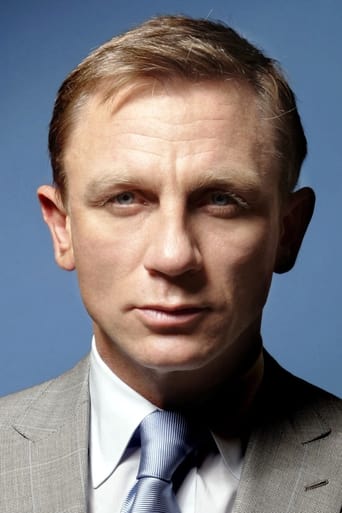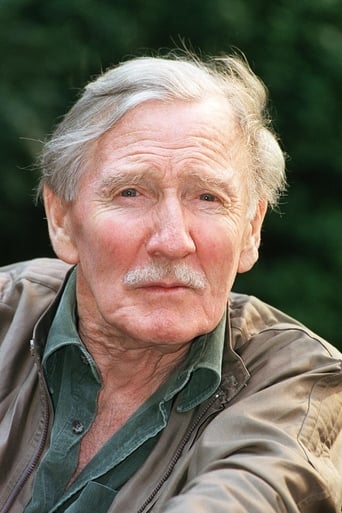Claysaba
Excellent, Without a doubt!!
ChicDragon
It's a mild crowd pleaser for people who are exhausted by blockbusters.
Plustown
A lot of perfectly good film show their cards early, establish a unique premise and let the audience explore a topic at a leisurely pace, without much in terms of surprise. this film is not one of those films.
Hayleigh Joseph
This is ultimately a movie about the very bad things that can happen when we don't address our unease, when we just try to brush it off, whether that's to fit in or to preserve our self-image.
NicolaiLevin
Just watched this with my better half on DVD. I had read the books before, she hadn't.I was positively surprised that the writers did not change much of Waugh's novels for dramatic condensation; they just omitted lots of peripheral characters and events of minor meaning to the overall plot.The main characters are well cast and the acting is excellent. In contrast to some other reviewers, I am convinced that Daniel Craig is the perfect fit for his appearing neutral in the crucial point of class. Guy does not represent a specific class in the novels either: He's too catholic and too old for being a "chap" among the officers, he is too introverted and serious to succeed in society, and too rich and educated and considering to be a role model for the ordinary men. No, he remains an outsider to all worlds - which gives him the best position for observing and documenting all the others.My better half liked the acting and thought the film gave her two good evenings of entertainment. Yet she was confused with the abrupt changes of locations and times (I had no problems with that with all the background knowledge of the novels and the dozens of Wikipedia pages I consulted to understand the novel's story while reading it).I can understand her: If you are not really into WWII (and even more: if you are non-British), you really get lost if those sandy rocks now represent mock Crete in Scotland, Egypt or real Crete and what the heck were the British doing in Greece anyway? I don't think it was a good choice to split the story in two parts, while the book is made of three. The story lacks a stringent climactic structure anyway (life seldomly follows the rules scriptwriters have set for entertaining plots), and stopping in the midst of volume 2 does not really make things better. Maybe a 3 or 4 part miniseries with a run-time of 7 or 8 hours total would have been more fitting with the Crete and Yugoslavia episodes deserving a full leg of attention.What I missed was the mentioning of Stalin. In the novel, two of Stalin's moves are main triggers for Guy's decisions: The Hitler-Stalin-pact of '39 convinces Guy to go back to England, join the army and fight the forces of evil. Germany's invasion of the USSR in '41 causes Stalin to change sides which makes Guy doubt his cause. The co-operation of the Allies with Stalin's Soviet Untion forms the quintessence of his conviction of the overall senselessness of his efforts. I can see that it is hard to make this fit into a movie version, but not to mention it at all? I also missed Stalin's sword mentioned although it is the name-giver to Waugh's trilogy.What became clear to me after watching it is that the material is still well suited for movie or series adaptations. So, Netflix, Amazon - anyone?
donita51
Having savoured Evelyn Waugh's magnificent trilogy, I approached this filmic adaptation fearlessly. The expectation of seeing Daniel Craig, a favourite actor of mine, added to the enticement. Finally, being a WW2 films buff, I believed I was in for a treat.What a letdown...It's not that this mini-series is badly made, that Craig does not act well or that the dialogue is stilted. It is just soooooooo sloooooooooooow (except for some (too few) battle scenes) that it borders on boring. The one notable exception was the depiction of the battle for Crete, which looks as if was filmed on location. It had the flavour of the real thing, conveyed through the bright photography. Also, Robert Daws as brigade major Hound was fantastic. To me (no prude) the love angle was over-emphasized, with Megan Dodds annoyingly bad. Altogether, it took up too much screen time at the expense of other, more important aspects like the War, character development or Guy's Catholic dilemmas.Also, watching Richard Coyle acting in the same mode as he did in Coupling made me realize what a limited actor he is although again, I stress that in Coupling he was the heart of the show.Some reviewers have already noted that this film does not compare well with the books it is based on. I will add that while most films indeed don't, this one was an extremely painful example of how not to make a TV series based on a book, especially a masterpiece.
siobhan-rouse
Like almost all of Waugh's novels, this is a lightly fictionalised version of incidents in his own life. Apart from the early one's, they were intended to advocate the austere and serious form of Catholicism that Waugh had converted to. But what makes him such a compelling storyteller is that he mixed comedy (light as well as grotesque) with the serious points, so that one never knows quite how a story will turn out. Waugh's life alternated between melancholy and farce - and that is how his fiction comes across as well. Maybe that's why when I read his novels and see the adaptations, I find myself nodding in agreement. Yes, that is what life is like ! I thought this version of Sword of Honour very good, but oddly structured. It started as three novels, so I would have thought it would make most sense as three segments, broadcast weekly. Instead we have two long "movies", which to the casual viewers must seem a bit jumbled.There are some superb acting performances here, though I found Daniel Craig as the hero a bit blank. Perhaps that is because, like Charles Ryder in Brideshead, the story is not really about him but about the people he meets and remembers in extraordinary circumstances. Previous reviewers have said that his wife Virginia comes across as very silly and unlikeable, but I disagree. I thought the actress (Megan Dodds - the end credits were so small that I couldn't read her name so I had to look on this site !) gave a very subtle and sophisticated performance. Really she is a woman who has never needed to think seriously about anything before, but the war experience forces her to. She becomes a Catholic - I think for Waugh this is one of the most important parts of the story.This is a worthy successor to the celebrated TV version of Brideshead Revisited, though I wanted it to go on longer ! Unlike Brideshead (which was stretched out to an absurd 13 hours), this trilogy of stories could have gone on much longer, and I still would have been absorbed.
Alice Liddel
'Sword of Honour' can be seen as an update of the Boultings' 'Pilgrim's Progress' - an anachronistic idealist fights in World War Two for reasons of chivalric honour, only to see the world overrun by liars, cheats, murderers, cowards and lunatics; where decency is pointless, even dangerous.
William Boyd's restructuring of Waugh's war trilogy is a miracle of adaptation - his leavening of verbal humour with slapstick; his capturing of Waugh's elliptical tone; his creation of haunting visual patterns acting as counterpoint to the horrific satire that is the war. There is one haunting sequence amid so much disintegration, the false bomb warning during Virginia's post-natal party, that magically hints at forces beyond man's self-defeating endeavour, while also rescuing a character Waugh was rather hard on. In the moral sense.

